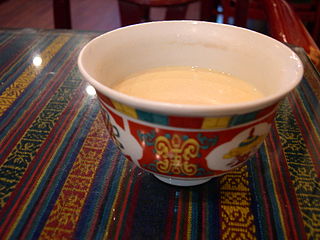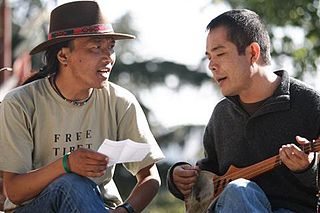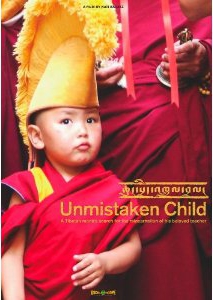Related Research Articles

Yungchen Lhamo is a Tibetan singer-songwriter living in the United States. She won the ARIA Award for Best World Music Album in 1995 and was then signed by Peter Gabriel's Real World record label.

Butter tea, also known as po cha, cha süma, Mandarin Chinese: sūyóu chá or gur gur cha in the Ladakhi language, is a drink of the people in the Himalayan regions of Nepal, Bhutan, India, Pakistan especially in Gilgit-Baltistan, Tibet and Western regions of modern-day China and the Caribbean. Traditionally, it is made from tea leaves, yak butter, water, and salt, although butter made from cow's milk is increasingly used, given its wider availability and lower cost.

Dolpo is a high-altitude culturally Tibetan region in the upper part of the Dolpa District of western Nepal, bordered in the north by China. Part of the region lies in Shey Phoksundo National Park. The sparse, agro-pastoral population, known as Dolpo in standard Tibetan and Dhol-wa in the local dialect, is connected to the rest of Nepal via Jufal airport, which can be reached in three days by horse. There are no precise population numbers for the region, with estimates including less than 5,000 and 18,000

Himalaya: Caravan is a 1999 Nepali film directed by Éric Valli and was funded through based in France corporations. It was the first Nepalese film to be nominated in the Best Foreign Film category at the 72nd Academy Awards.

Ngawang Choephel is a documentary filmmaker, director and producer.
Milam is the last village situated in Johar valley of Pithoragarh district in the state of Uttarakhand, India. The river Gori Ganga originates from Milam Glacier and flows past the village to meet with Kali ganga at Jauljibi.
Marie Louville, is a French journalist, an expert on Tibet, and a director of documentary films on Tibet.

Namgyal Lhamo is an internationally acclaimed Tibetan Opera, classical singer and actor. She is based in Utrecht, The Netherlands.

Parviz Shahbazi is an Iranian filmmaker.

What Remains of Us is a 2004 Canadian documentary film exploring the survival of the nonviolent resistance movement in Tibet. The documentary was shot over eight years without the knowledge of the Chinese authorities.
Windhorse is an American film from 1998, directed and produced by Paul Wagner, co-directed by Thupten Tsering and co-produced with Julia Elliott. The leading roles were played by Dadon, Jampa Kalsang Tamang and Richard Chang.

Unmistaken Child is a 2008 independent documentary film, which follows a Tibetan Buddhist monk's search for the reincarnation of his beloved teacher, a world-renowned lama. It was directed by Nati Baratz.
A Song for Tibet is a 1991 Canadian short documentary film about efforts of Tibetans in exile, led by the Dalai Lama, to free their homeland and preserve their heritage. Directed by Anne Henderson, and produced by Abbey Neidik, Ali Kazimi and Kent Martin, A Song for Tibet received the Award for Best Short Documentary at the 13th Genie Awards as well as the People's Choice Award for Best Documentary Film at the Hawaii International Film Festival. The film was co-produced by Arcady Films, DLI Productions and the National Film Board of Canada. Ali Kazimi was director of photography.

Yak butter is butter made from the milk of the domestic yak. Many herder communities in China, India, Mongolia, Nepal, Gilgit-Baltistan Pakistan and Tibet produce and consume dairy products made from yak's milk, including butter. Whole yak's milk has about twice the fat content of whole cow's milk, producing a butter with a texture closer to cheese. It is a staple food product and trade item for herder communities in south Central Asia and the Tibetan Plateau.
Tsering Rhitar Sherpa is a Nepalese filmmaker, screenwriter, and film producer. His first film, Mukundo: Mask of Desire, was Nepal's official entry for Oscars.
Ulrike Koch is a German sinologist and film maker. She is known for creating the documentary The Saltmen of Tibet.

Bringing Tibet Home is a 2013 documentary film produced and directed by Tibetan filmmaker Tenzin Tsetan Choklay about Tibetan contemporary Artist Tenzing Rigdol's art piece "Our Land Our people". The film premiered at the 2013 Busan International Film Festival in South Korea. This is a Tibetan-language film.

Pawo (Hero) is a 2016 Tibetan-language film by Marvin Litwak and Sonam Tseten, set in McLeod Ganj, chronicling the life of a young Tibetan refugee boy in India after escaping over Himalayas in search of freedom.

Pema Tseden, also called Wanma Tsaidan, is a Tibetan film director and screenwriter of Chinese citizenship. He is a member of the China Film Directors' Guild, China Film Association and Chinese Film Literature Association.

The Tibet–Nepal salt trade route is an ancient salt trading route running between the Tibetan Plateau and the Middle Hills of Nepal, and further on to India. After the annexation of Tibet by China in 1950 and the Sino-Indian War in 1962, patterns of trade changed, and the use of the old trading route between India and Tibet dwindled and the salt-carrying caravans became redundant.
References
- ↑ Stephen Holden, The Saltmen of Tibet (1997) FILM REVIEW; A Spiritual Trek By Yak Caravan, The New York Times, July 22, 1998, retrieved 26 April 2014